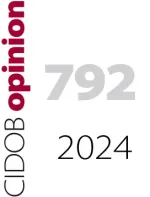Ukraine puts us to the test

When the full-scale Russian offensive began on 24 February 2022, few observers believed it possible that, two years later, one of the world’s largest armies would still be bogged down in Ukraine. The country has resisted but must have more military and political support. Ukraine needs to advance towards European Union and NATO membership, albeit progressively, as is being discussed in Brussels.
* This article was published in Spanish in the daily La Vanguardia.
Ukraine is a test for Europe or, in other words, a test for all of us. A well-known contributor to La Vanguardia recently argued that we should be very wary about letting into our “Edenic” European club countries like Ukraine, which are “riddled with corruption and authoritarian traditions”. When I first arrived in Spain in 1964, this was precisely how the country seemed to me. When the dictatorship ended, the desire to join Europe, to “be like Europe”, was enormous, but Spain was not yet ready. Hence, according to the aforementioned writer’s logic, it should not have been allowed to join the European Union either. It took us almost ten years to be admitted. And the country changed, thanks in particular to the prospect of EU membership, because it was adapting to EU values, putting them into practice, not the other way around.
Spain joined the EU, not because it was already a consolidated democracy but because it demonstrated that it aspired to be one by passing all the requisite tests. The same is true for Ukraine, which started actively preparing more than ten years ago. There is still a long way to go but those who know the country well also know that most of the population aspires to European values and principles as well as to the standard of living. The battle against corruption is at the heart of public debate and specialised organisations are closely monitoring government policy in this area. The goal of joining Europe has always had greater support in Ukrainian public opinion than that of NATO membership. This was the case until the Russian aggression began in 2014 with the occupation of part of Donbas and the annexation of Crimea, which Russia had already seized from the Tatars. Now Ukraine urgently needs both memberships, even if the process is progressive, as is currently being discussed in Brussels. It is difficult to find in Europe a more pro-European intellectual elite and civic activism than there is in Ukraine. They are not asking to be given anything for free. They want to pass the test on their own merits.
After the failure of the second counteroffensive and with the front locked in a battle for positions that is reminiscent of World War I, the predominant view now is that Ukraine cannot win. Is it really so evident? Every war has advances and setbacks. When the full-scale attack began on 24 February 2022, most observers believed that the Russians would sweep away the Ukrainians and very few imagined that, two years later, one of the world’s biggest armies would still be bogged down. However, what is clear is that the Ukrainians cannot do everything by themselves.
One often hears the gloomy question: what is the international community doing to stop Vladimir Putin? Let us start by thinking about ourselves. After all, we are the basis of this community. The best way to do stop him is to help the Ukrainians to win. To achieve this, public opinion in all our countries must urge each government to keep helping them in every possible way, starting with military support. Putin made his point with Tucker Carlson. “If you really want to stop fighting, you need to stop supplying weapons. It will be over within a few weeks, that’s it, and then we can agree on some terms.” In Putin’s world, Ukraine does not exist and Europeans will have little say in the outcome of the war he has unleashed, which will be decided solely by him and Washington.
Always an acute observer, Ivan Krastev ventured in the Financial Times (16 February 2024) that, “For Moscow, the postwar status of Ukraine would ideally resemble the future of the Palestinian state as envisioned by Israel’s extreme right. At best it would be an occupied territory; at worst a demilitarised, depopulated and economically unsustainable state.” When the United States and Russia, the two powers that have determined Europe’s security architecture, are wobbling our response must be commensurate with the danger. If our weapons and munitions run out, we must produce more and improve our defence capabilities. Otherwise, we will be helping Putin and also complicit in the fate that awaits a vanquished Ukraine, as the mass graves near Izium portend.
Walking around Bucha and Irpin, cities where the Russian troops committed their first atrocities, leaving their streets strewn with corpses of civilians with their hands tied behind their backs, I could barely see the ravages of the assault. The inhabitants had set about rebuilding their homes, often with their own hands, in yet another act of civic resistance to aggression. Some build and others destroy. “Don’t give up”, Navalny urged the citizens of Russia. This is exactly the stance of the citizens of Ukraine. They have not given up and, right now, are not planning to give up. They will resist as long as they can. The rest is in our hands.
Keywords: Ukraine, Russia, war, EU, membership, NATO, enlargement, Europe, Putin, counteroffensive, resistance
All the publications express the opinions of their individual authors and do not necessarily reflect the views of CIDOB as an institution.